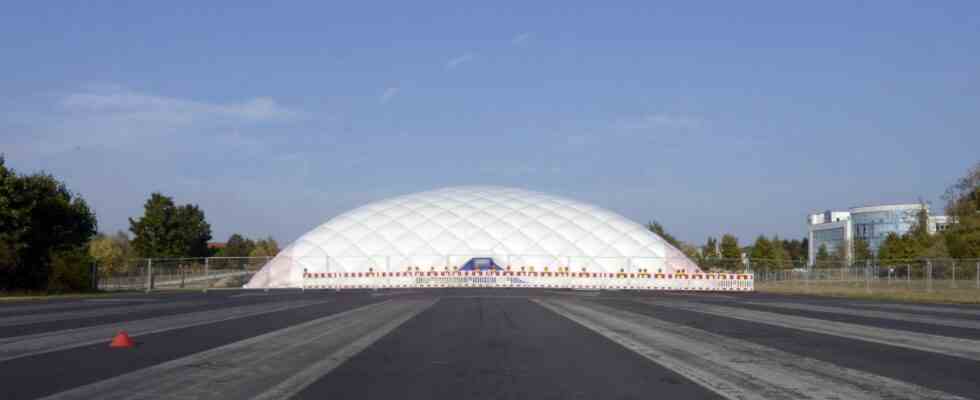District Administrator Christoph Göbel (CSU) swears that the people in the district of Munich and politicians understand and accept the admission, accommodation and integration of refugees from Ukraine as a long-term task. The past few weeks, said Göbel on Monday afternoon at the district council meeting in Garching’s town hall, have shown that the challenge is and will be much greater than assumed at the beginning of the Russian war of aggression. In the meantime, more than 2,700 people have arrived in the district, 600 of them have found accommodation in decentralized accommodation in the district, and the rest of those seeking protection live in private accommodation.
The willingness of the population in the district to take in people from the Ukraine is enormous, Göbel found; it is now the task of district politics to find options for subsequent accommodation as quickly as possible. “We have to assume that the return of the refugees to their country will not be possible in the short term,” said the district administrator.
In order to cope with the massive influx of refugees in the district office – about a third of all those seeking protection in Germany currently reach the Free State of Bavaria – above all, registration processes would have to be “compressed and adapted”, Göbel made clear. Head of department Martin Scholtysik explained that the registration system is complicated and the processes are currently still somewhat “diffuse”; According to Scholtysik, the processes should be significantly accelerated, especially with the switch to online registration. When people arrive in the district, they can now pre-register online on the homepage of the district office, then an appointment is made with the immigration office and biometric data is recorded. In order to then be able to work, those seeking protection must also apply for a so-called fictional certificate at the central contact point of the Upper Bavarian government in the state capital – only with this certificate do they have access to the job market.
District Administrator Christoph Göbel swears people in for a long-term challenge in the reception, accommodation and integration of refugees from Ukraine.
(Photo: Claus Schunk)
CSU district councilor Nicola Gerhardt said that this additional step was too bureaucratic, a one-off registration at the municipal level should actually be enough. “You should work at a higher level to ensure that everyone gets a work permit,” said the Garchingerin. “Otherwise the process will be held up unnecessarily. Teachers, educators and well-trained people who could work immediately come.” District Administrator Göbel, on the other hand, said that this step was the right one. “I think registration is necessary, we Germans also have to register at the registration office,” he replied. “If the registration does not take place, the outcry would be great.”
The immediate registration with the government of Upper Bavaria must take place within six months, but is also extremely important in order to gain access to medical care, said Scholtysik. “We’re also experiencing a huge rush there. And many people have also brought cases of illness while fleeing, including heavily pregnant women; we’ve seen all constellations there.”
The Kreissparkasse waives account management fees
However, the right to register here and to claim benefits under the Asylum Seekers Benefits Act does not apply to everyone, Göbel made clear once again. Anyone who was and is entitled to reside in Ukraine may take advantage of it – regardless of citizenship. But not Ukrainians who came from the United States or another country. “We’ve had cases like this, including in Egypt, but it’s not a war zone.”
In order to make everyday life easier for people who can now arrive here quickly and who will soon be going to work, the Kreissparkasse Ebersberg München Starnberg, for example, waives the account management fees for Ukrainians who open an account. This is very important because it also relieves the municipalities if the aid to those seeking protection in the town halls does not have to be paid in cash, said Unterschleißheim town hall boss Christoph Böck (CSU). Göbel added that there are currently talks with other banks with the aim that they should do the same.
The fire brigades in the district help with the first aid for the refugees. Sometimes also in Munich, like here Michael Spägele from the Neufahrn fire brigade, Andreas Gollasch from Hohenschäftlarn and Stefan Höne from Ebenhausen (from left).
(Photo: Claus Schunk)
According to the district administrator, the “incredibly large number” of people who are currently reaching the district will pose great challenges for all those involved, including when it comes to counseling and integration. Christoph Nadler, leader of the Greens, warned that quality should be the top priority when it comes to advice and integration – preferably through the welfare organizations. “It needs qualified personnel with experience,” he said. Göbel agreed and said no price tag would be attached here. Nicola Gerhardt, who is also active in the Garching helper group, pointed out that people are now arriving who need completely different advice than, for example, those seeking protection in 2015. “There must not only be pure social work in the shelters, it needs native-speaker work, for example Supplementary classes, trauma management.” And the people in private accommodation would also have to be reached.
Meanwhile, the acquisition of further accommodation and the development of accommodation options continues unabated. Because, according to head of department Scholtsyk, currently used accommodations such as hotels would not be available forever. So far, the district office has been able to find 620 new accommodation places in hotels, guesthouses or residential buildings – but that won’t be enough. With the support of the municipalities, a further 1880 places are to be created in residential container systems and air domes. Two container blocks will be built in Unterhaching on Biberger Strasse and in Unterschleißheim on northern Ingolstädter Strasse with space for up to 380 refugees.

